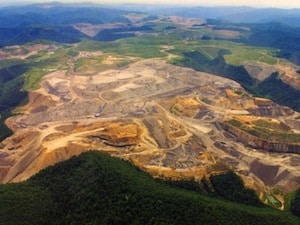Researchers at Washington State University and West Virginia University have released a new report that links an increase in birth defects in Appalachia to the practice of mountaintop removal mining (MTR or MTM). The study shows that communities exposed to the wastes created by blowing up mountains to extract coal experience significantly higher instances of birth defects.
A press release on the new report summarized the findings as follows:
The study was based on analysis of over 1.8 million birth records between 1996 and 2003 in central Appalachia. Prevalence rates were higher in mountaintop mining areas compared to non-mining areas for circulatory/respiratory, central nervous system, musculoskeletal, gastrointestinal, urogenital, and ‘other’ types of defects. Spatial correlation between mountaintop mining and birth defects was also present, indicating that MTM activity in one county may have increased birth defect prevalence rates in surrounding counties.
Nationally, about 1 in every 33 children born in the United States are born with some form of birth defect. The areas in the study were revealed to have a 26% higher chance of birth defects. Researchers were careful to rule out other known causes of birth defects in the study, including smoking and drinking, to make sure that the numbers were reflective of only MTR-exposed mothers.
One of the most prevalent chemicals found in coal and released during the MTR process is mercury. Excessive exposure to mercury has been known to cause severe birth defects.
This new study is just the latest in a long line of studies that have shown how dangerous mountaintop removoal coal mining is for human health. In May of this year, West Virginia University released a study showing that overall public health in areas affected by MTR is lower than that of the general public. For example, those living in communities exposed to the impacts from MTR reported an average of 18 more “unhealthy” or “sick” days than those living in areas that were not exposed to coal.
DeSmogBlog reported in a January 2010post about another study of the impacts of MTR on health:
A group of the nation’s leading environmental scientists is calling on the U.S. Environmental Protection Agency and the U.S. Army Corps of Engineers to stop issuing new mountaintop mining permits, arguing that the ecological and human health costs of the controversial mining practice are “pervasive and irreversible.” …
Along with this environmental devastation, the authors confirm major impacts on human health in the Appalachian region, including “elevated rates of mortality, lung cancer, and chronic heart, lung and kidney disease in coal producing communities” according to the study.
For more information on the companies involved in mountaintop removal mining, visit this earlier post: “Massey Energy Is Not The Only Mountaintop Removal Mining Villain.”
For an eye-opening look at the impacts of mountaintop removal on Appalachian communities, keep an eye out for the new movie “The Last Mountain” in theaters. View the trailer below:
Subscribe to our newsletter
Stay up to date with DeSmog news and alerts






